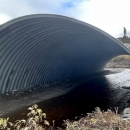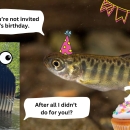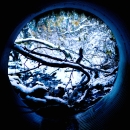States
AlaskaThis project will replace a culvert on Tyonek Creek near the Native Village of Tyonek, A Dena’ina Athabascan community in remote western Cook Inlet, Alaska. This project benefits Coho and pink salmon, both vitally important environmentally, economically, culturally and as a subsistence resource. This project will complete a ten-year, multi-agency effort to remove all barriers in the Tyonek Creek watershed, opening a total of 31 miles of habitat. Improving habitat connectivity on this cooler stream ensures fish can access high quality, intact habitat as warming temperatures begin to degrade streams nearby. Replacing undersized culverts with larger or more appropriate crossings also ensures the safety of the road system and allows Tyonek to maintain working emergency evacuation routes.
Project Quick Facts:
| Project Status | In Development |
| Location | AK, Kenai Peninsula Borough |
| NFPP Project Funding | $780,000 |
| Restoration Techniques | Culvert Replacement |
| Accomplishments | 15 Stream Miles Reopened |
| Partner Project Lead | Tyonek Tribal Conservation District |
The National Fish Passage Program combines technical expertise with a track record of success.
Implemented primarily through the Service's Fish and Wildlife Conservation Offices, the National Fish Passage Program provides financial and technical assistance to partners across the country. Since 1999, the program has worked with over 2,000 local communities, Tribes, and private landowners to remove or bypass over 3,400 barriers to fish passage fish passage
Fish passage is the ability of fish or other aquatic species to move freely throughout their life to find food, reproduce, and complete their natural migration cycles. Millions of barriers to fish passage across the country are fragmenting habitat and leading to species declines. The U.S. Fish and Wildlife Service's National Fish Passage Program is working to reconnect watersheds to benefit both wildlife and people.
Learn more about fish passage and reopen access to over 61,000 miles of upstream habitat for fish and other animals. Staff have expertise in fish migration and biology as well as financial, engineering, and planning assistance to communities, Tribes, and landowners to help them remove barriers and restore rivers for the benefit both fish and people.
Fish passage project proposals can be initiated by any individual, organization, government, or agency. However, proposals must be submitted and completed in cooperation with a Fish and Wildlife Conservation Office. (Please note that fish passage projects being used for federal or state compensatory mitigation or required by existing federal or state regulatory programs are not eligible for funding through the National Fish Passage Program.)
CONTACT A FISH PASSAGE COORDINATOR IN YOUR AREA TO GET STARTED.



